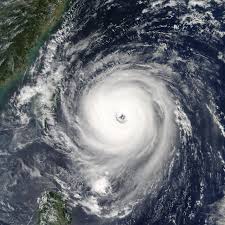typhoon

n. [气象] 台风
n.
台风;
变形
复数:typhoons
双语释义
n.(名词)[C](发生在西太平洋的)台风 a very violent tropical storm with a circular wind in the western Pacific
英英释义
typhoon[ tai'fu:n ]
n.a tropical cyclone occurring in the western Pacific or Indian oceans
同近义词辨析
typhoon, storm, hurricane这组词都有“大风”的意思,其区别是:
typhoon主要指西太平洋海洋上发生的极猛烈的风暴,风力常达十级以上。
storm指雷电交加的暴风雨,也多作引申用。
hurricane指12级大风,有时指发生在西印度群岛的大气旋。
双语例句
用作名词(n.)
The typhoon is gathering strength.
台风的风力正逐渐增强。
The typhoon hit the coastal area.
台风侵袭沿海地区。
The navy rescued forty people in the typhoon.
海军在台风天时救了四十个人。
The typhoon pulled up many trees by the roots.
台风把许多树连根拔了起来。
They have received notice of a typhoon approaching.
他们已收到台风即将来临的预报。
权威例句
TyphoonGrowing typhoon influence on east Asia
Tempest and typhoon: user-level shared memory
Tempest and Typhoon: user-level shared memory
Interdecadal changes in summertime typhoon tracks
Typhoon Structure as Revealed by Aircraft Reconnaissance. Part II: Structural Variability
Reflections on "Tempest and Typhoon: User-level Shared Memory"
Global Warming and Western North Pacific Typhoon Activity from an Observational Perspective
Four-year follow-up of TYPHOON (trial to assess the use of the CYPHer sirolimus-eluting coronary stent in acute myocardial infarctio...
Sedimentary differences between the 1993 Hokkaido-nansei-oki tsunami and the 1959 Miyakojima typhoon at Taisei, southwestern Hokkaid...
typhoon
typhoon: [16] A typhoon is etymologically a ‘great wind’. The word was adapted from Cantonese Chinese daai feng ‘great wind’, its form no doubt influenced by Greek Tūphón, father of the winds in Greek mythology (his name was derived from the verb túphein ‘smoke’, which also produced túphos ‘smoke’, hence ‘fever causing delusion’, source of English stew, typhoid, and typhus).
typhoon (n.)
Tiphon "violent storm, whirlwind, tornado," 1550s, from Greek typhon "whirlwind," personified as a giant, father of the winds, perhaps from typhein "to smoke" (see typhus), but according to Watkins from PIE *dheub- "deep, hollow," via notion of "monster from the depths." The meaning "cyclone, violent hurricane of India or the China Seas" is first recorded 1588 in Thomas Hickock's translation of an account in Italian of a voyage to the East Indies by Caesar Frederick, a merchant of Venice:
concerning which Touffon ye are to vnderstand, that in the East Indies often times, there are not stormes as in other countreys; but euery 10. or 12. yeeres there are such tempests and stormes, that it is a thing incredible, but to those that haue seene it, neither do they know certainly what yeere they wil come. ["The voyage and trauell of M. Caesar Fredericke, Marchant of Venice, into the East India, and beyond the Indies"]
This sense of the word, in reference to titanic storms in the East Indies, first appears in Europe in Portuguese in the mid-16th century. It aparently is from tufan, a word in Arabic, Persian, and Hindi meaning "big cyclonic storm." Yule ["Hobson-Jobson," London, 1903] writes that "the probability is that Vasco [da Gama] and his followers got the tufao ... direct from the Arab pilots." The Arabic word sometimes is said to be from Greek typhon, but other sources consider it purely Semitic, though the Greek word might have influenced the form of the word in English. Al-tufan occurs several times in the Koran for "a flood or storm" and also for Noah's Flood. Chinese (Cantonese) tai fung "a great wind" also might have influenced the form or sense of the word in English, and that term and the Indian one may have had some mutual influence; toofan still means "big storm" in India.From the thighs downward he was nothing but coiled serpents, and his arms which, when he spread them out, reached a hundred leagues in either direction, had countless serpents' heads instead of hands. His brutish ass-head touched the stars, his vast wings darkened the sun, fire flashed from his eyes, and flaming rocks hurtled from his mouth. [Robert Graves, "Typhon," in "The Greek Myths"]
1. The punch line was that he lost his pants in the typhoon.
好笑的是他在台风中掉了裤子。
-- 来源 -- 英汉 - 辞典例句
2. The typhoon inflicted severe damage on the island.
台风给岛上造成重大损失。
-- 来源 -- 英汉 - 辞典例句
3. The typhoon is gathering strength.
台风的风力正逐渐增强。
-- 来源 -- 英汉 - 辞典例句
4. A typhoon in 1954 sank a ferry, drowning 1,218 people.
一九五四年的一次台风刮沉了一艘渡轮,淹死一千二百十八人。
-- 来源 -- 英汉 - 辞典例句
5. They have received notice of typhoon approaching.
他们已收到台风即将来临的预报。
-- 来源 -- 英汉 - 辞典例句
6. The highest peak of earthquake at September corresponds to the typhoon season in Japan.
9月的地震活动的最高峰与日本的台风季节相对应。
-- 来源 -- 英汉 - 辞典例句
7. A typhoon blustered over the land.
台风扫过大地。
-- 来源 -- 英汉 - 辞典例句
8. The typhoon held up our visit to the island.
台风妨碍了我们去这个岛参观.
-- 来源 -- 英汉 - 辞典例句
9. The crops were ravaged by the typhoon.
农作物遭台风毁坏。
-- 来源 -- 英汉 - 辞典例句
10. The trees were leveled by the typhoon.
树木被台风刮倒了。
-- 来源 -- 英汉 - 辞典例句
